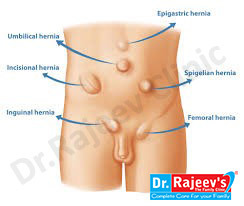

An epigastric hernia is one that occurs in the epigastric region of the abdomen, which is located above the belly button and below the ribcage.
If you have an epigastric hernia, you may be able to feel it when there is pressure on the abdominal wall, such as when you cough, laugh, or bear down to have a bowel movement.
You may also have some pain or tenderness around where the hernia is.
An estimated 2 to 4 percent of all hernias that occur in the groin are femoral ones. Women experience femoral hernias more often than men.
Femoral hernia cause for concern due to the femoral artery and vein being nearby. It’s possible the hernia could affect these blood vessels and block blood flow to and from the leg.
A hiatal hernia is a condition that occurs when a person’s stomach bulges through a weak point in the diaphragm, a muscle that separates the lungs from the abdominal organs.
If you have a hiatal hernia, you’re more likely to have problems with acid reflux.
An incisional hernia can occur after a person has stomach surgery, which usually involves an incision down the middle of the stomach. If the surgical wound doesn’t heal completely, that person can be more vulnerable to developing a hernia.
INGUINAL HERNIA
It occurs when a portion of intestine or fat bulges through the lower stomach wall. The bulge usually goes through the inguinal canal, which is located in the groin area.
An inguinal hernia can contain a portion of the small intestine in some people and even parts of the female reproductive organs in some women.
In umbilial hernia tissues in the body bulge through an area of weakness in the belly button area (umbilicus).
This hernia causes a visible bulge in or around the belly button that’s usually worse when you cough or strain when having a bowel movement.
The most common symptom of hernia is a bulge or lump in the affected area.
One may find that the lump disappears when they lying down. One are more likely to feel their hernia through touch when one are standing up, bending down, or coughing. Discomfort or pain in the area around the lump may also be present.
Some types of hernia, such as hiatal hernias, can have more specific symptoms. These can include things like heartburn, trouble swallowing, and chest pain.
In many cases, hernias have no symptoms.
Hernia is caused by a combination of muscle weakness and strain. Depending on its cause, a hernia can develop quickly or over a long period of time.
Some common causes of muscle weakness or strain that can lead to a hernia include:
There are also certain things that can increase risk of developing a hernia. They include:
Nux Vomica : Very useful medicine for all types of Hernia like femoral, inguinal or umbilical.Useful for hernia in those people abdominal muscles have been weakened due to long-standing constipation. There is constant urge to pass stool. Useful when there is excessive craving for stimulants like alcohol or coffee. Useful for weakness and soreness in the abdominal muscles.
CALCAREA CARB : Useful for hernia for obese people with weak abdominal muscles due to excessive fat in the abdomen.Useful treatment of Hernia in children who sweat excessively on the head. Suited to patients who are sensitive to cold air. There is also an unusual craving for boiled eggs or chalk or lime.
LYCOPODIUM : Useful for hernia when there is weak digestion and excessive flatulence in the abdomen.
RHUSTOX : Useful for hernia where the abdominal muscles become weak due to excessive strain by lifting heavy weights. Very useful medicine for strengthening the abdominal muscles.